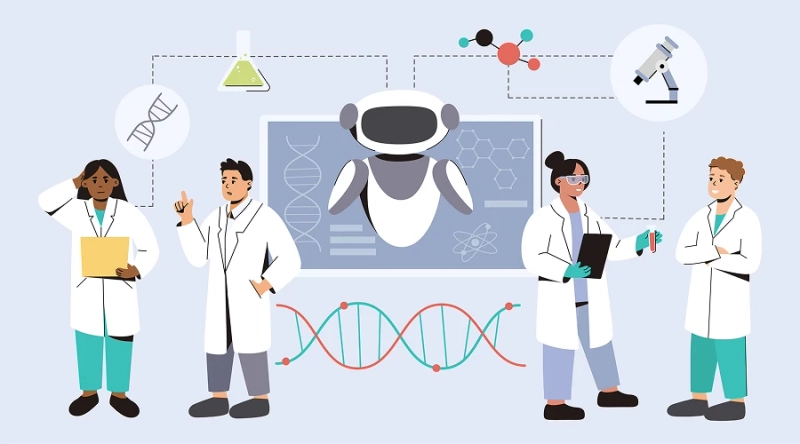Clinical trials today operate in a vastly different environment than even a few years ago. As a sponsor or researcher, you’re likely encountering terms like artificial intelligence (AI), real-time data integration, and patient-centric approaches at every turn. Beneath this buzz lies a critical technical reality: the integrity, usability, and agility of your clinical trial datasets depend directly on the sophistication of your clinical trial data management company’s systems and processes.
Modern clinical research data management services must go beyond traditional data capture and validation; they need to anticipate emerging trends, integrate diverse data streams, and deliver scalable, compliant solutions aligned with the latest regulatory frameworks.
AI-Driven Clinical Data Management: Beyond Automation
EDC clinical trial software integrates advanced AI and machine learning capabilities directly within your data management ecosystem. These intelligent platforms ingest and process complex trial data ranging from adverse event reports to biometric sensor outputs, identifying anomalies, trends, and safety signals ahead of manual review.
For example, recent implementations of electronic data capture software for clinical trials leverage machine learning to analyze real-time data from wearables, detecting physiological changes such as abnormal heart rate patterns. Early detection enables protocol amendments that enhance patient safety and accelerate study timelines, shifting from retrospective data correction to proactive, real-time trial oversight.
Integrating Real-World Data: Technical Challenges
The explosion of real-world data from mobile health apps, remote sensors, and electronic health records has redefined what EDC for clinical trials must handle. Today’s leading electronic data capture clinical trials systems include robust ETL pipelines that ingest varied formats, harmonize terminology, align timestamps, and ensure data provenance.
The most effective clinical trial data capture software automates this integration—supporting adaptive trial designs informed by dynamic patient data and enabling responsive, evidence-based decision-making.
Navigating Compliance: A Multifaceted Regulatory Landscape
EDC software for clinical trials embeds compliance-by-design, addressing regulations such as GDPR, HIPAA, and 21 CFR Part 11. These platforms employ layered access controls, end-to-end encryption, and automated audit trails. Advanced AI-driven security analytics continuously monitor data usage patterns, flagging potential protocol violations and managing risk proactively. This automated vigilance expedites regulatory inspections and helps keep studies audit-ready and uninterrupted.
Cloud-Based Infrastructure: Global Collaboration & Scalability
Leading clinical trial data capture software platforms leverage cloud computing for scalability, fault tolerance, and global accessibility. Multi-region cloud environments allow clinical teams, sponsors, and CROs to collaborate in real time, enhancing efficiency and data integrity.
Cloud EDC solutions also feature role-based access controls, immutable logs, disaster recovery, automated validation workflows, and support for version control—ensuring regulatory compliance and data integrity through the entire trial lifecycle.
Specialized EDC Solutions for Complex and Rare Disease Trials
Rare diseases and novel therapeutics demand more than generic EDC clinical trial software. The best EDC solutions offer tailored modules and custom data pipelines—supporting granular capture of biomolecular assay data, sophisticated patient-reported outcomes, and flexible metadata tagging.
These specialized capabilities empower operational efficiency and cost optimization.
Agile Platforms for Hybrid and Adaptive Trials
With hybrid trials combining on-site and decentralized patient monitoring, the demands on electronic data capture software for clinical trials have increased. Platforms must unify data from wearables, e-diaries, telemedicine, and site assessments while executing continuous data quality checks.
Modern modular architectures support seamless integration of new data sources and analytics tools, empowering sponsors to pivot trial designs as evidence and regulator guidance evolve.
Strategic Considerations: Selecting an EDC Partner in 2025
Selecting the optimal clinical trial data capture software in 2025 is not just about data management—it’s about strategic partnership. The right EDC clinical trials solution must enable:
-Seamless integration of diverse real-world data with strict data governance.
-Embedded, proactive compliance (encryption, audit trails, automated security).
-Cloud-based, globally accessible infrastructure for real-time collaboration and scalability.
-Specialized modules for rare diseases and complex trial designs.
-Adaptive, flexible platforms supporting hybrid models and evolving data needs.
In this data-intensive, rapidly evolving research landscape, your clinical trial data capture software is the foundational pillar driving trial efficiency, regulatory compliance, and innovation. Choose a partner with demonstrable expertise in EDC clinical trial systems, technical excellence, and future-ready adaptability—a choice that will define your trial’s trajectory toward success.



